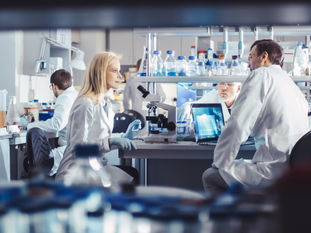July 10, 2024
By Dr. Alexandra Reed, Chief Scientific Officer at BioVisioner
In the fast-paced world of biological research, the integration of AI is nothing short of revolutionary. As someone deeply involved in this transformation, I’ve seen firsthand how AI is reshaping our approach to some of the most complex challenges in biology. At BioVisioner, we’re at the forefront of this change, and I’m excited to share some insights on how AI is making a real difference in our field and what the future might hold.
The Transformative Power of AI in Biological Research
AI is no longer just a concept we discuss at conferences—it’s an essential tool that’s driving real progress in biological research. At BioVisioner, we’ve focused on harnessing AI to help researchers decode complex biological data with unprecedented speed and accuracy. This isn’t just about making processes faster; it’s about enabling discoveries that were previously out of reach.

Take genomics, for example. With the sheer volume of data involved, it’s easy to get overwhelmed. But with AI, we can sift through that data and find the critical insights, whether it’s identifying a new gene associated with a disease or understanding how different genes interact. This capability isn’t just accelerating research—it’s opening doors to new possibilities.
Balancing AI with Human Expertise
Of course, integrating AI into biological research isn’t without its challenges. One of the biggest hurdles is finding the right balance between AI-driven insights and human interpretation. AI can analyze data on a scale that’s impossible for humans, but it’s the scientists who bring the context and understanding that turn those insights into meaningful results.
At BioVisioner, we’ve addressed this challenge by fostering close collaboration between our AI specialists and biologists. This approach ensures that our technology isn’t just a tool—it’s a partner in the research process. One of the most exciting outcomes of this collaboration was a recent project where we used AI to model protein interactions, leading to the discovery of new potential therapeutic targets.

Looking Ahead: The Future of AI in Biology
As I look to the future, I’m incredibly optimistic about the continued integration of AI in biological research. We’re only beginning to scratch the surface of what’s possible. Over the next decade, I expect we’ll see even more profound changes in how we conduct research, especially in areas like personalized medicine.
Personalized medicine is a field that really excites me. AI has the potential to transform how we treat patients by tailoring therapies to their unique genetic makeup. This could lead to more effective treatments with fewer side effects, which would be a game-changer for patient care.
At BioVisioner, our goal is to stay ahead of these developments. We’re committed to continuously advancing our platform to meet the evolving needs of researchers. By pushing the boundaries of what AI can do, we’re helping shape the future of biology.
Final Thoughts
The intersection of biology and AI is an exciting place to be, and I’m proud to be part of a team that’s leading the way. At BioVisioner, we’re not just using AI to speed up research—we’re using it to unlock new possibilities and drive innovation in ways we never thought possible. I’m looking forward to seeing where this journey takes us, and I’m confident that the future holds even more groundbreaking discoveries.


